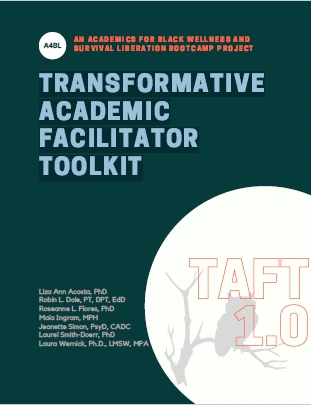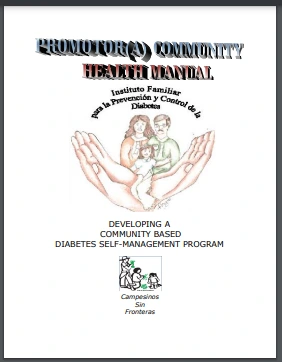Community Health Workers linking clinics and county health departments to create healthy communities. Linking Individual Needs to Community and Clinical Services (LINKS)
There is a strong body of evidence that community health workers (CHWs) can directly impact health promotion behaviors, chronic disease self-management, and positive health outcomes. LINKS is the AzPRC core research project. We are focusing upstream by shining a light on how CHWs strengthen communication and collaboration between clinics and county-level services. We call this approach community-clinical linkages (CCL). To learn more about this model and how your clinic can replicate it, we invite you to utilize the LINKS Replication Guide.

TRANSFORMATIVE ACADEMIC FACILITATOR TOOLKIT
Academics for Black Survival and Wellness (A4BL) is a personal and professional development initiative for Non-Black academics to honor the toll of racial trauma on Black people, resist anti-Blackness and white supremacy, and facilitate accountability and collective action. A4BL also is a space for healing and wellness for Black people. Below is the Transformative academic facilitators' toolkit
Acosta, L.A., R. L. Dole, R. L. Flores, M. Ingram, J. Simon, L. Smith-Doerr, and L. Wernick. 2021. Transformative Academic Facilitator Toolkit (TAFT) version 1.0. Academics for Black Survival and Wellness Liberation Bootcamp Project ( https://www.academics4blacklives.com).

Abstract: Diabetes is a devastating disease and disproportionately impacts ethnic minorities in death and illness related to this disease. Culturally responsive diabetes education and support programs are not available in many communities. The Promotora Community Health Manual: Developing a Community-Based Diabetes Self Management Program provides a conceptual framework for designing or refining a program of community support for diabetes self management. This guide was developed primarily by and for community health workers, known as promotores/as in Mexican American communities, but is also a useful tool for supervisors and program managers in both community-based and clinical settings. The overall objectives of the manual are: 1) to provide a general orientation to the philosophy and preparation of promotores/as or community health workers; 2) to explore aspects of diabetes self management that may not be addressed in clinical care, such as managing stress and depression, the inclusion of the family in promoting self management, and the role of spirituality in caring for diabetes; 3) to provide promotores/as and programs with practical strategies, tools, and suggestions that will assist them in working effectively with their community; and 4) to consider programmatic aspects of a clinical versus a grassroots program for a promotor/a diabetes self management program.
Redondo F, Torres E, Castro I, Villaseñor A, Ingram M. Promotora Community Health Manual: Developing a Community-Based Diabetes Self-Management Program. CES4-Health.info 2010.




